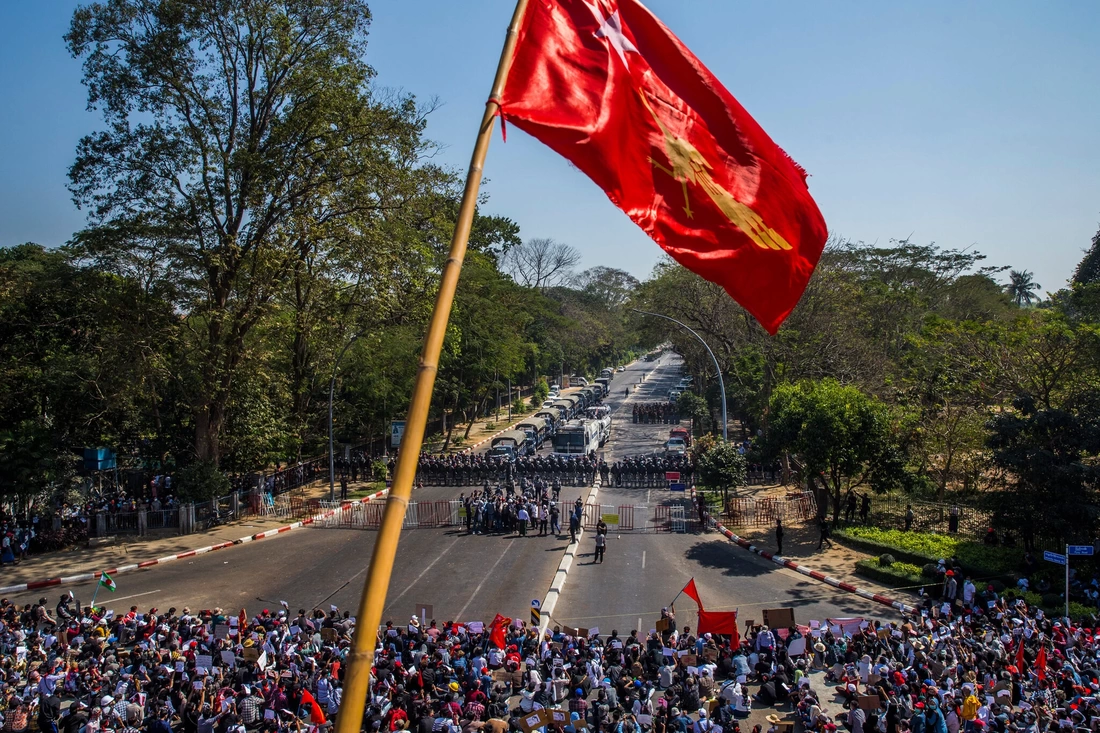|
In South Asia, between India and Thailand, the reclusive country of Myanmar has been turned upside down in the past three weeks. The democratic experiment that began in 2011 following the transfer of some power from Myanmar’s military, the Tatmadaw, came to an end in the early morning hours of February 1st. While military coup d’états are not as common as they once were, this development could have far-reaching implications for the new foreign policy goals of the Biden administration. President Joe Biden has publicly committed to upholding human rights and democracy worldwide. China has expressed an interest in improving its relationship with the United States under the Biden administration, but significant U.S. intervention in Myanmar would undoubtedly strain relations further. China has invested greatly in Myanmar in the past decade, most notably with the Belt and Road Initiative. To understand U.S. policy options, one must consider the coup in the context of Myanmar’s fraught history. As Myanmar’s parliament prepared to convene on the morning of February 1st, Tatmadaw soldiers secured the building and detained the country’s civilian leadership, including the de facto civilian leader, Daw Aung San Suu Kyi. Officially, the Tatmadaw was merely exercising its constitutional right to declare a state of emergency, in this instance due to allegations of election fraud, which it has said will last for one year. Unofficially, Myanmar is once more outwardly ruled by a military junta—the norm and not the exception since a 1962 coup d’état. In response to the coup, protests have erupted across the country. Largely, the military government has remained silent—no top generals have spoken to the public or to the media, except for the coup leader and de facto ruler Senior General Min Aung Hlaing. Nevertheless, military officials have moved quickly to introduce a law which would make criticizing the junta in any way (including online) punishable by up to three years in prison. World leaders have condemned the coup, including President Biden, who announced sanctions against the coup leaders. Thus far, the only substantial action the United States has taken is to restrict access to the $1 billion in Myanmarese funds held in the United States. President Biden did, however, say that more repercussions would follow. Further sanctions by the United States are not likely to significantly impact Myanmar’s military government—most of their trade is done with China, which has invested over $20 billion in the country since 1988. Notably, China has not yet passed judgement on the coup, officially referring to the Tatmadaw’s actions as a “major cabinet reshuffle.” The question is, “What should the U.S. do?” The answer may be unpalatable to some, but it is simple: do nothing more than what has already been done. The action of inaction may naturally lead some to question President Biden’s stated commitment to human rights and democracy, especially as the coup represents his first foreign policy challenge. Even so, thinking practically, there is nothing the United States can do. Sanctions have limited effect owing to the lack of trade between the United States and Myanmar. Although the U.S. could pressure its allies in the region to adopt their own sanctions, these measures would only increase Chinese influence in the country. Politically, the United States has no levers to pull with the ruling junta, and any sort of military operation would be a fool’s errand. Indeed, the Biden administration has done all that it can do already—verbal condemnation of the coup and support for those protesting for the restoration of civilian leadership. This is not to say, however, that the United States cannot benefit from the situation. To exercise that benefit, however, the Biden administration must be willing to set aside its lofty goals of human rights and democracy; the tried-and-true principles of realpolitik must be embraced, if only temporarily. The classic example of realpolitik in U.S. foreign policy is Richard Nixon’s decision, engineered by Secretary of State Henry Kissinger, to establish diplomatic relations with the People’s Republic of China (PRC). Recognition of the PRC hurt the U.S.’s previous relationship with the Republic of China (Taiwan), but it allowed the United States to gain a more cooperative relationship with the Soviet Union. Nixon chose practical and realistic policy over a commitment to anti-communism, allowing the U.S. to play China and the Soviet Union off each other. Similarly, the United States may benefit from inaction due to poor relations between China and the Tatmadaw. Beijing has funded communist insurgents in Myanmar and developed a close relationship with Daw Aung San Suu Kyi. It is uncertain the exact benefits the United States may derive from doing nothing at this time, but inaction at the very least allows the United States to foster a closer relationship with China, free of unneeded roadblocks. Nevertheless, it is equally imperative that President Biden and Secretary of State Antony Blinken not forget the verbal commitment the United States has made toward defending human rights and democracy. It is easy to fall into a pattern of stasis when nothing is done in response to an administration's first foreign policy crisis. Nevertheless, each situation is different and unique; the next challenge the administration faces will be different, and the United States may derive greater benefit from taking more concrete actions. Protests in Yangon, from The New York Times The views expressed above are solely the author's and are not endorsed by the Virginia Policy Review, The Frank Batten School of Leadership and Public Policy, or the University of Virginia. Although this organization has members who are University of Virginia students and may have University employees associated or engaged in its activities and affairs, the organization is not a part of or an agency of the University. It is a separate and independent organization which is responsible for and manages its own activities and affairs. The University does not direct, supervise or control the organization and is not responsible for the organization’s contracts, acts, or omissions.
0 Comments
Your comment will be posted after it is approved.
Leave a Reply. |
Categories
All
Archives
April 2022
|
ADDRESSVirginia Policy Review
235 McCormick Rd. Charlottesville, VA 22904 |
|
SOCIAL MEDIA |

